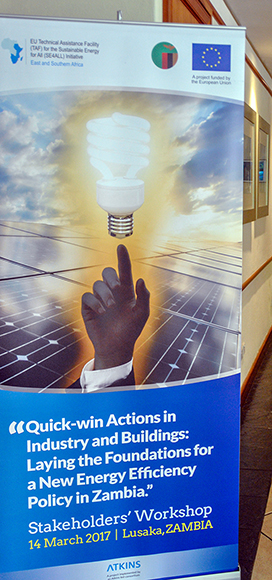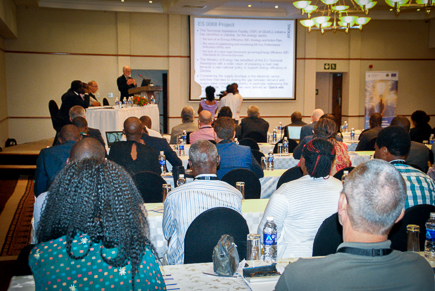HCL is implementing the ‘Energy Efficiency Quick Win Actions’ initiative, funded by the European Union. The electricity situation in Zambia needs a strategy for a quick matching of electricity demand with available supply. ZESCO cannot keep up with the demand and has introduced load shedding and, at present, some industries in Zambia are working significantly below their capacity.
 Aiming to close the gap between electricity demand and supply, the 'Energy Efficiency Quick Wins Actions’ initiative focuses on the demand side of four types of the energy consumers in Zambia: Energy Intensive Industries; Street Lighting; Public, Tertiary Sector and Residential Buildings; and Solar Water Heating Systems.
Aiming to close the gap between electricity demand and supply, the 'Energy Efficiency Quick Wins Actions’ initiative focuses on the demand side of four types of the energy consumers in Zambia: Energy Intensive Industries; Street Lighting; Public, Tertiary Sector and Residential Buildings; and Solar Water Heating Systems.
The Quick Wins project presented the results of its work at a Stakeholders Workshop, held in Lusaka, Zambia on March 14, 2016. The workshop brought together some 100 stakeholders from Zambia and the region presenting ideas and replicable experiences to reduce demand for energy and contribute to the development of an energy efficiency policy for the country.
The workshop revealed that opportunities for energy savings in buildings and industries in Zambia are numerous, and may therefore contribute to a potential reduction of the electricity consumption of up to 50%.
 The total potential electricity saving calculated from the prefeasibility studies performed in 14 Zambian companies and institutions is about 30 GWh/year. This corresponds to the power generation demand of 14 MW or electric consumption of 6,000 households connected to the electricity grid or 60,000 households benefitting from off grid power solutions. This is only a sample, which does not cover the biggest energy consumer - mining industry, but it clearly shows that the potential impact of energy efficiency measures countrywide may be very significant.
The total potential electricity saving calculated from the prefeasibility studies performed in 14 Zambian companies and institutions is about 30 GWh/year. This corresponds to the power generation demand of 14 MW or electric consumption of 6,000 households connected to the electricity grid or 60,000 households benefitting from off grid power solutions. This is only a sample, which does not cover the biggest energy consumer - mining industry, but it clearly shows that the potential impact of energy efficiency measures countrywide may be very significant.
The representative of the Ambassador of the European Union to Zambia and COMESA, H.E. Alessandro Mariani, said during the opening session of the workshop: “the savings that can be made from energy efficiency initiative are significant and compelling for all of us to implement them in the shortest time frame for the benefit of Zambia and its citizens.” This action is promoted by the EU Technical Assistance Facility for the ‘Sustainable Energy for All (SE4ALL), Eastern and Southern Africa’ initiative.

